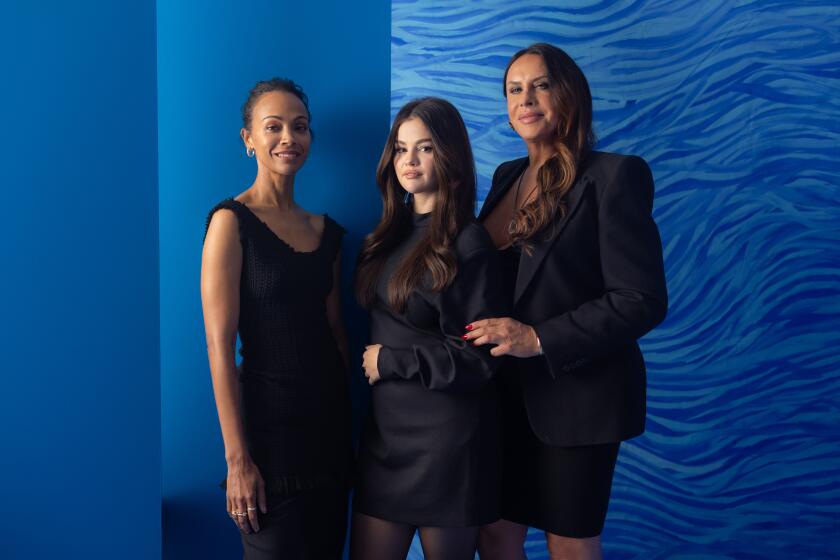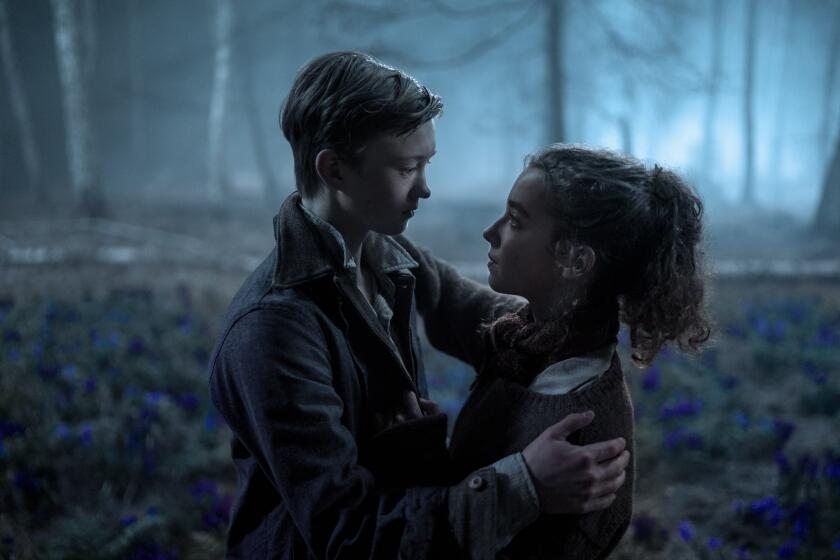Men who work hard for the money
In the new movie “Spread,” Ashton Kutcher plays Nikki, a pretty but shallow grifter who finances his glamorous existence in Los Angeles by methodically seducing rich women and then living off their largess. Nikki isn’t technically a prostitute, though in some ways a simple cash transaction for his services might be easier on him. “There’s an old saying ‘We’re all whores. Just some of us get paid,’ ” says Kutcher, who also produced the film. “I think people are in general using people all the time.”
Kutcher, with his penchant for tweeting and gimmicky reality shows, is known as a guy with his finger on the pulse of pop culture. He’s hardly the only star out there turning tricks these days. There’s also the HBO water-cooler series “Hung,” in which a financially desperate high school basketball coach, Ray Drecker (Thomas Jane), moonlights as a male escort, with the aid of his female pimp, a would-be poet played by Jane Adams. In France, French comedic staple Josiane Belasko has directed another tale of male harlotry, “Cliente,” which has been playing the festival circuit in the U.S. And TV shows like “Gossip Girl,” “Dollhouse” and “Nip/Tuck” have all showed men trading on their sex and looks.
The last time the screen was filled with so many images of heterosexual male hooking was back in 1969, when Joe Buck (Jon Voight) was flaming out as a would-be escort in “Midnight Cowboy”; in the 1970s, when Dan Aykroyd’s workman-like Fred Garvin was trolling through “Saturday Night Live” for ladies and laughs; and in 1980, when glamorous Richard Gere was unintentionally launching the whole phenomenon of men-as-sex-objects playing the title character in “American Gigolo.”
To Kutcher, “Spread” is a modern update: “All those movies delve into how people use sexuality as a weapon and tool in their life.” Yet Kutcher’s character merely arrives at a muted personal epiphany about relationships from his forays rather than experiencing the shame and trauma that met some of his cinematic forefathers. Still, notes Kutcher, “Anyone who enters into that [kind of] agreement has some insecurity that’s leading them there, otherwise they wouldn’t be there.”
To several film academics, the return of the male escorts has more to do with the sagging economy than anything else. “What are we hearing on the news? Who are the people losing their jobs? It’s mostly men who are doing the heavy physical work,” says UCLA film professor Vivian Sobchack, who believes the phenomenon reflects “a larger castration anxiety” about the economy. Ironically, the cinematic male escort is often depicted as a kind of super stud. “To sell yourself is abjection, but it’s all focused around male potency,” Sobchack says. “Very often our dreams play out as the opposite.”
“When there’s an economic downturn, movies start taking a look at people under pressure,” says film historian Jeanine Basinger. “In the Depression, [characters] picked up tommy guns and went out and robbed people. Presumably it’s an act of economic desperation in some way.”
Basinger also sees a gender component in this new wave of men on the hustle, and it in part reflects a growing social acceptance of powerful women going after much younger mates.
Kutcher and his 16-years-older wife, Demi Moore, have probably done more than anyone in America to glamorize this meme. The object of his exploitation in “Spread,” played by Anne Heche (who also happens to star as Drecker’s ex-wife in “Hung”), is presented as an unsympathetic, sexually voracious, controlling career woman who resorts to vaginal rejuvenation cosmetic surgery because she’s so insecure about keeping up with her faithless companion.
That differs sharply from “Hung,” which seems to be adding a kind of feminist twist to the phenomenon. Here, the setup is that Drecker is now forced to really contemplate, even methodically study, the eternal question of what women want not just sexually but emotionally as well. His gal pimp has even officially chucked the escort moniker and re-branded him as a female-friendly “happiness consultant.”
“We wanted to write a middle-class hero who’s fallen on hard times,” says “Hung” executive producer Dmitry Lipkin, who created the series with his wife, Colette Burson. “The middle class is being squeezed out. This is a guy who’s fighting for his little piece of turf, next to the big McMansion on the lake.”
“If he were not driven to do this by the economy, ironically, it would not be nearly as sexy,” adds Burson. “If you felt he had free will in the situation, it wouldn’t be as appealing.”
A decent Midwestern sort, Drecker isn’t a beautiful metrosexual in the Gere or Kutcher mode. He’s a kind of man’s man, a version of the guy most of his clients have married.
“It’s an appealing concept to women. On some conscious level, he reminds them of the men in their lives,” Burson says. “In real life they have their own insecurities, weaknesses and fears to deal with. But because of the financial nature of the transaction, they feel empowered and liberated enough to speak their mind in a way they’re not in real life. They’re able to say what they want without fear of ridicule.”
“It’s occurred to me that one of the sexiest things that Ray has is not his penis but his ears,” continues Burson. “He listens hard. He tries to understand them. Women really want men to try, and Ray really tries. Women think that’s super sexy.”
--
More to Read
Only good movies
Get the Indie Focus newsletter, Mark Olsen's weekly guide to the world of cinema.
You may occasionally receive promotional content from the Los Angeles Times.










